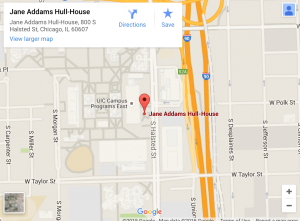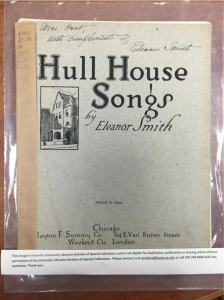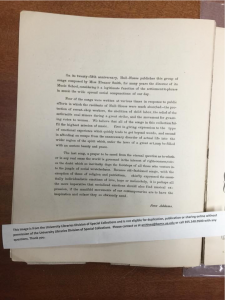

Located in the city of Chicago, the music program within Hull House was very politically influential. While Hull House originated in order to aid immigrants in acculturating to American life, its music program went above and beyond this goal. The music taught at Hull House was successful in helping Americanization while tying in cultural roots and background. The music that emerged from Hull House helped immigrants learn about American life while simultaneously teaching them about groups of people in society that faced oppression. This included non-natives, women, children, laborers, and any other group of people that experienced unequal treatment. “The Sweat Shop”, for example, is one composition found in Hull House Songs that expresses the poor labor conditions that were prevalent during the early twentieth century.
By educating its residents on the current political issues, it promoted an awareness that spread beyond the walls of Hull House and into the surrounding urban area. The musical score also included “Suffrage Song” in response to the lack of women’s voting rights in this period. Jane Addams, the founder of Hull House, used this music to further her argument in the advocation for women’s voting rights. The music created within Hull House was surprisingly compelling ad influential. It attracted the attention residents and essentially created a ripple effect in its proximity. Hull House Songs also consists of three other songs titled: “The Shadow Child”, “Land of the Noonday Night”, and “Prayer”. Each song dealt with a significant issue at the time, such as the abolition of child labor and the relief of miners. In her foreword, Jane Addams makes it very clear that it is important to publish these songs in order to consider the “legitimate function of the settlement to phrase in music the wide spread compunctions of our day” (Hull House Songs). The Hull House Songs were important in their use of musical talent and skill to develop newly immigrated peoples and to maintain political activism within the surrounding community.

Bibliography
Addams, Jane. 800 S. Halsted Street (M/C 051), Chicago IL, 60607-7017. Place.
Hull House Interior. Outline Sketch Descriptive of Hull House. Pfeiffer University, n.d. Web. 4 Oct. 2015.
Smith, Eleanor. Hull House Songs. Chicago: Clayon F. Summy, 1915. Print.
Jordan Mlcoch